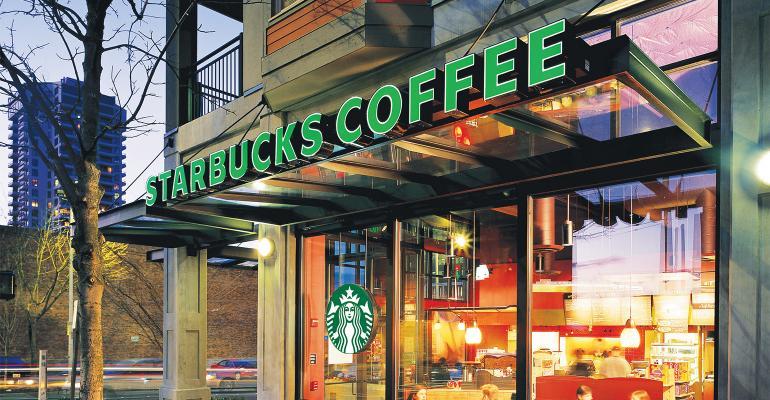Starbucks CEO Kevin Johnson said in his Wednesday letter to Congress asking for relief for communities and small businesses that the company plans to raise the minimum wage for all Starbucks employees to at least $15 an hour over the next two to three years.
“As we always do, we will continue to explore what more we can do to provide compensation and benefits in support of our partners,” Johnson said in his letter.
With the November announcement that the company would raise wages by at least 10% starting Dec. 14, along with a starting salary increase of 5% across the board, 30% of Starbucks store-level employees company-wide would be bringing home $15 an hour.
The company’s baristas have been pushing for a minimum wage increase for a long time now, and a petition to change the Starbucks hourly wages to $15 currently has nearly 10,000 signatures on Coworker.org. President-elect Joe Biden has also vowed to raise the national minimum wage to $15 an hour.
But a plan to increase hourly wages is not the only change Starbucks announced this week. Here are six more key takeaways from Starbucks this week, including insights from Wednesday’s Investor Day event:
Express store formats ‘are here to stay’
Starbucks will be accelerating the growth of its new express store formats — including pickup and drive-thru locations — with plans to expand them to 45% of the company’s store portfolio by 2023, Starbucks chief operating officer Rosalind Brewer said during Wednesday’s Starbucks Investor Day event. Right now, the new store formats represent about 35% of the company’s store portfolio, and the to-go-focused formats “are here to stay,” she said.
“We’re accelerating these formats focused on convenience across the U.S.,” Brewer said during Wednesday’s presentation. “[…] As we introduce more efficient formats, we’re reducing long lines that occur in metro locations to unlock new sales […] We’ll harness data analytics to learn and adapt as we go and optimize the operating system within our stores to make it easier to serve customers in drive-thrus. We’ll enhance service experience with warming ovens, for example.”
Ambitious growth goals
Starbucks chief financial officer Patrick Grismer noted in Wednesday’s investor event that he is “as optimistic as ever” about the company’s growth model and said that they plan to grow to 55,000 stores worldwide by the year 2030, a number that is “currently unmatched” by any other food and beverage company. Starbucks’ net unit growth target will be 6% annually by 2023-2024, he added.
“Our growth at scale agenda is compelling and we’re increasingly differentiating Starbucks by catering to customers in ways they prefer, from drive-thru lanes, to-go and delivering to wherever they are,” Grismer said.
Increased customization
In Wednesday’s presentation, Rosalind Brewer painted a picture of how exactly Starbucks’ rigorous customer data analytics could help create more personalized experiences for guests. Right now when you order from new drive-thru Starbucks locations, the digital menu board will offer suggestions based on your location, the time of day, weather and even inventory. But they plan to take that feature even further:
“In the future, guests will receive personalized suggestions on how to improve their drinks and suggestions for making things better,” she said. “We’re also testing low and no sugar platforms, allowing people to customize their preferred level of sweetness.”
More plant-based drink options
Starbucks also announced the release of a new drink on Wednesday as part of its growing plant-based beverage platform. The iced shaken espresso made with brown sugar and oat milk will launch this spring, simultaneously as Starbucks expands the availability of oat milk to all stores in the U.S. following a successful test.
The new iced shaken espresso will join a growing lineup of plant-based options, including the coconut milk Cascara Latte and iced pineapple matcha drink, and other beverages made with plant-based milk foams released early in 2020.
Upgraded green initiatives
Starbucks also announced on Wednesday new and upgraded planet-friendly promises, including plans to cut their carbon, water and waste footprints by half. They also plan to build next-generation on-site solar stores with five in the works in California. Another project will bring to life the company's first Virtual Power Purchase Agreement (VPPA), which will offset 50% of Starbucks company-operated roasting and beverage production sites' electricity consumption in the U.S by 2022.
Along with rolling out oat milk nationwide, Starbucks announced that they will also be partnering with U.S. Dairy to commit to reducing greenhouse gas emissions. The company will be partnering with Farm Powered Strategic Alliance to repurpose food waste in the Starbucks food supply chain into renewable energy.
Lastly, Starbucks is donating $500 million to the Global Farmer Fund to help small coffee farmers gain access to capital to help their farms run productively and sustainably.
“Our planet positive initiatives have a central role in our long-term business strategy, and directly address what our customers are asking for,” Starbucks CEO and president Kevin Johnson said during Wednesday’s presentation. “We are moving toward a more circular economy, and we are doing so in a very intentional, transparent and accountable way.”
Restaurant industry support
Johnson also doubled down Wednesday on his support of the restaurant industry and small businesses, as outlined in his letter to Congress. Johnson emphasized his support of a COVID relief bill that helps small businesses, including restaurants and mom and pop coffee shops.
"We need Congress to take action," he said in his presentation to investors.
“Starbucks urges Congress to take immediate bipartisan action to pass new COVID relief legislation to address the urgent needs in our communities, especially for the millions of Americans out of work, small businesses facing economic uncertainty and the public health needs of state and local governments on the front lines of the pandemic,” Johnson said in his letter to Congress.
Contact Joanna Fantozzi at [email protected]
Follow her on Twitter: @JoannaFantozzi





